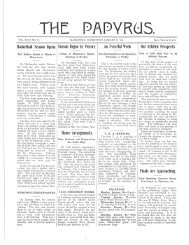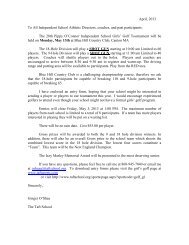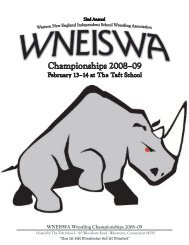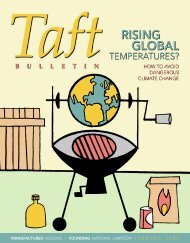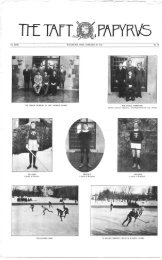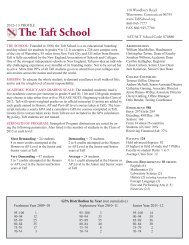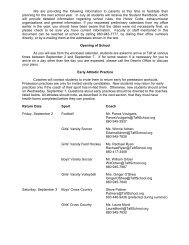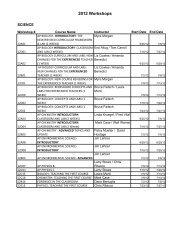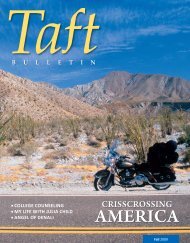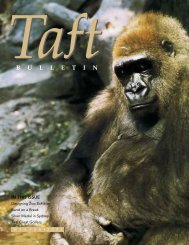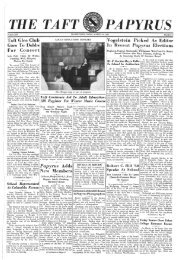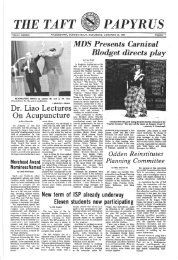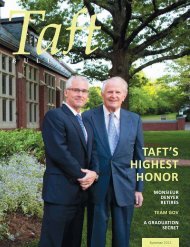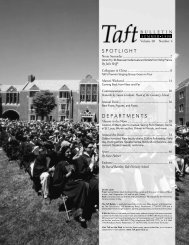Download - The Taft School
Download - The Taft School
Download - The Taft School
You also want an ePaper? Increase the reach of your titles
YUMPU automatically turns print PDFs into web optimized ePapers that Google loves.
opportunity,” Lee explained. “It ended up being a<br />
rather extraordinary opportunity.”<br />
In April of 2001 former President William J.<br />
Clinton accepted South African President Nelson<br />
Mandela’s invitation to attend the Civil Society<br />
Conference in Cape Town. Clinton brought a<br />
delegation from the U.S., which included representatives<br />
from City Year. It was there that the<br />
seeds for City Year in South Africa were sown.<br />
<strong>The</strong> new program would bring together young<br />
leaders from around the world who share a passion<br />
for civic participation and service, with the<br />
goal of strengthening democracy at home and<br />
abroad. South Africa was the pilot country for<br />
this program: it would be known as the Clinton<br />
Democracy Fellowship and it would be built in<br />
South Africa by City Year alumna Lee.<br />
“I was amazed by the country’s commitment<br />
to young people, not only in its creation of a<br />
National Youth Service Policy, but in its designation<br />
and celebration of an entire holiday for<br />
young people—Youth Day,” Lee explained. “Early<br />
on, I came to understand the role that young<br />
people played in combating apartheid in South<br />
Africa and the important role that they continue<br />
to play in building democracy in their country<br />
and around the world.”<br />
Full Circle<br />
After four years in South Africa Lee returned<br />
to the United States to continue her work in<br />
education, becoming the Vice President of<br />
Communications and Development for the Ohio<br />
Charter <strong>School</strong> Association (OCSA).<br />
“My first project in the first education class<br />
I ever took at Cornell was on charter schools,”<br />
Lee recalls. “I studied things like school choice<br />
and vouchers. At Harvard, I worked in a charter<br />
school. It fit that I should continue my career<br />
with a charter school association.”<br />
She was soon recruited by a member of the OCSA board to join Concept<br />
<strong>School</strong>s, an education management and consulting group based in Chicago.<br />
Concept <strong>School</strong>s was building technology, math and science-based charter<br />
schools throughout the Midwest. In her new role Lee worked with local<br />
authorizing agencies to advance charter school applications. That included<br />
working with the Chicago Public <strong>School</strong>s and their Chief Executive Officer<br />
at the time, Arne Duncan. Duncan is currently the United States Secretary<br />
of Education.<br />
“Charter schools represent change, and change is very political. <strong>The</strong><br />
authorization process is rigorous and rooted in law,” explained Lee. “In<br />
South Africa, everything that came across my desk related to law and<br />
policy. Working first for the Ohio Charter <strong>School</strong> Association and then for<br />
Concept <strong>School</strong>s I found myself once again engaged with law and policy.<br />
It became increasingly clear that to effect change I needed a deeper knowledge<br />
of the law.”<br />
In her application to law school, Lee made it clear that her interest in law<br />
school went beyond practicing law. Still, she spent a summer at a law firm<br />
to see if there was a spark. <strong>The</strong> spark instead came through her weekend<br />
work with <strong>The</strong> Law and Leadership Institute. <strong>The</strong> Institute was established<br />
by the Ohio Supreme Court under Chief Justice Thomas J. Moyer. Its goal<br />
is to target disadvantaged high school students and help them develop the<br />
knowledge, skills and interest to pursue careers in law.<br />
“We taught them basic English skills, basic writing skills, enrichment,”<br />
Lee said. “We engaged them in oral debates and taught them how to argue.<br />
It was very fulfilling and it is what I am most passionate about.”<br />
This passion for empowering youth and impacting change on a<br />
global level made Lee a natural fit for the position of Global Service and<br />
Scholarship Department chair at <strong>Taft</strong>.<br />
Lee formally joined the <strong>Taft</strong> <strong>School</strong> community in August 2010. She<br />
teaches classes in service learning, social justice and human rights. Her impact<br />
in the classroom has been swift and significant; it also brings the value<br />
of her past experience into sharper focus.<br />
“For my human rights research paper, I examined hate speech to determine<br />
when it crosses the line,” explained Lauren Laifer ’11. “To support<br />
my thesis, I needed to dissect countless Supreme Court cases, all of which<br />
were far too convoluted to understand. Ms. Lee sat down with me and went<br />
through each Supreme Court case, translating what seemed like a foreign<br />
language into something comprehensible. She simply wanted me to learn,<br />
and she was willing to spend as much time with me as necessary to make<br />
sure that I did.”<br />
Lee is also the dean of multicultural affairs and education and works closely<br />
with the Davis International Scholars Program, which identifies and recruits<br />
30 <strong>Taft</strong> Bulletin Winter 2012



